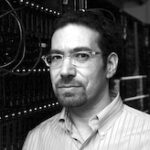
On the job, physicists who identify as LGBTQ+ experience—and also witness —behaviors ranging from shunning and homophobia to harassment at alarmingly high rates, according to the first-ever study of the experiences of LGBTQ+ scientists in a peer-reviewed journal. The study, which recently appeared in Physical Review Physics Education Research, also found that LGBTQ+ people from marginalized gender, racial, and ethnic groups faced even more challenges. Michael Falk, professor of materials science and engineering and vice dean for undergraduate education, was a co-author on that study.
1. Why is this study important?
We don’t elicit the best science, engineering, art, or anything from our collective efforts if we exclude people from contributing based on arbitrary prejudices. We need every human being to be able to bring their “A game” to the work. It is hard to do that if you are facing active hostility or a basic lack of respect.
2. Did anything about the results surprise you?
Yes, one thing is how gendered the climate issues are for LGBTQ+ people in physics. Bisexual and lesbian women face significantly more hostility than gay and bisexual men, and gender-nonconforming people report the least welcoming environments. Trans people face the most discrimination. The second surprising finding was that observing exclusionary behavior, even more so than experiencing such exclusion, correlated with leaving the profession. It was sobering to realize that the public performance of exclusion was so impactful. That is a powerful insight, and a deeper understanding of how that plays out could benefit our inclusion efforts.
3. Does this study shed light on the experiences of LGBTQ+ engineers in general?
While each community is necessarily different, I believe that similar dynamics are in play in a variety of STEM disciplines. At the same time, there are different values in each community. It has been observed that the physics community tends to fetishize “genius” and “innate talent” in ways that may serve to reinforce assumptions and reward privilege. Engineering has a culture that strongly values professionalism and teamwork. These can be deployed to exclude people who don’t immediately mesh with the team. Conversely, they can provide the impetus for more inclusive practices. But this will only be the case if we train our engineering students and instill in our colleagues an expectation that it is the height of professionalism to create teams that are open to diversity.




